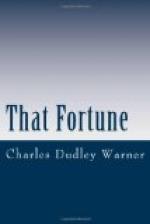“Of course you wouldn’t. But it costs like everything to go to Africa, or anywhere.”
“I’d make a book about it, and give lectures, and make lots of money.”
“I guess,” said Celia, reflecting upon this proposition, “I’d be an engineer or a railroad man, or something like that, and make a heap of money, and then I could go anywhere I liked. I just hate to be poor. There!”
“Is Jim poor?”
“No; he can do what he pleases. I asked him, then, why he didn’t go to Africa, and he wanted to know what was the good of finding Livingstone, anyway. I’ll bet Murad Ault would go to Africa.”
“I wish he would,” said Philip; and then, having moved so that he could see Celia’s face, “Do you like Murad Ault?”
“No,” replied Celia, promptly; “he’s horrid, but he isn’t afraid of anything.”
“Well, I don’t care,” said Philip, who was nettled by this implication. And Celia, who had shown her power of irritating, took another tack.
“You don’t think I’d be seen going around with him? Aren’t we having a good time up here?”
“Bully!” replied Philip. And not seeing the way to expand this topic any further, he suddenly said:
“Celia, the next time I go on our hill I’ll get you lots of sassafras.”
“Oh, I love sassafras, and sweet-flag!”
“We can get that on the way home. I know a place.” And then there was a pause. “Celia, you didn’t tell me what you are going to do when you grow up.”
“Go to college.”
“You? Why, girls do, don’t they? I never thought of that.”
“Of course they do. I don’t know whether I’ll write or be a doctor. I know one thing—I won’t teach school. It’s the hatefulest thing there is! It’s nice to be a doctor and have your own horse, and go round like a man. If it wasn’t for seeing so many sick people! I guess I’ll write stories and things.”
“So would I,” Philip confessed, “if I knew any.”
“Why, you make ’em up. Mamma says they are all made up. I can make ’em in my head any time when I’m alone.”
“I don’t know,” Philip said, reflectively, “but I could make up a story about Murad Ault, and how he got to be a pirate and got in jail and was hanged.”
“Oh, that wouldn’t be a real story. You have got to have different people in it, and have ’em talk, just as they do in books; and somebody is in love and somebody dies, and the like of that.”
“Well, there are such stories in The Pirate’s Own Book, and it’s awful interesting.”
“I’d be ashamed, Philip Burnett, to read such a cruel thing, all about robbers and murders.”
“I didn’t read it through; Alice said she was going to burn it up. I shouldn’t wonder if she did.”
“Boys make me tired!” exclaimed this little piece of presumption; and this attitude of superiority exasperated Philip more than anything else his mentor had said or done, and he asserted his years of seniority by jumping up and saying, decidedly, “It’s time to go home. Shall I carry your wreath?”




